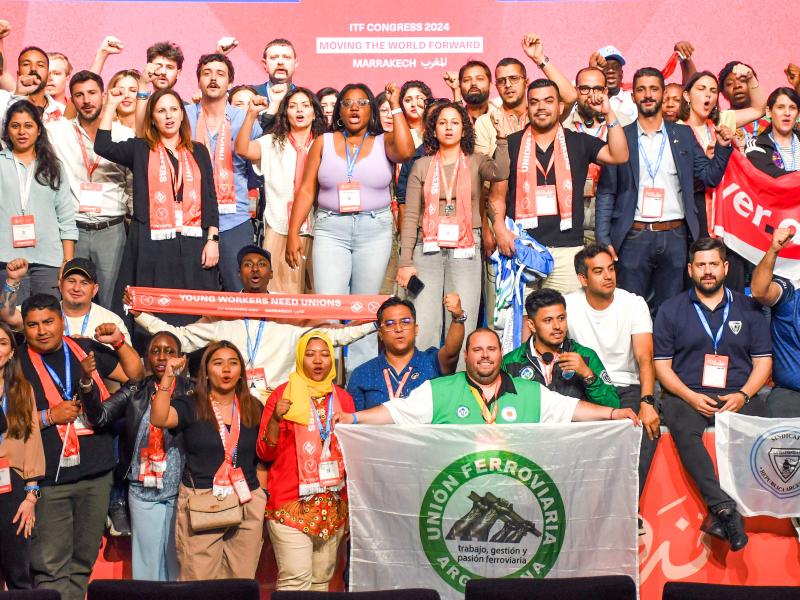As Malta becomes the 34th ILO member state to ratify the Maritime Labour Convention (MLC) 2006, the ITF (International Transport Workers’ Federation) today gave its cautious approval to the progress made across the shipping world to prepare for the convention’s all important coming into force this August.
The ITF is actively monitoring efforts to prepare for the MLC’s entry into operation – including its own. It believes that the legislation, the first worldwide bill of rights for seafarers, can make a positive difference to everyone serving at sea, irrespective of their nationality and the flag the ship they are on is flying.
Dave Heindel, chair of the ITF seafarers’ section, commented: “The ITF has been involved from the birth of the MLC and so it’s only right that we ensure that we and our fellow trade unions are making all necessary efforts to help it achieve the success it deserves. For us that has meant rigorous monitoring, and projects to explain and support the legislation in action – for example in the way we work together with port state control.”
He continued: “The results of that monitoring suggest that satisfactory progress is being made by the majority of organisations and companies to prepare for August. That includes the way the ILO is spreading the word about the need for preparedness, and positive feedback from port state control about readiness for implementation. We were also glad to see the cluster of ratifications recently, including Greece and Finland this month.
“We are also continuously pushing for further ratifications. Whether they are major port states or flag states, it is vital that everyone involved in shipping has ratified.”
The ITF sees the following as particular strengths of the MLC in how it will affect seafarers:
• The potential to stop blacklisting and charging for jobs by some manning agents;
• The recognition of all crew – including hospitality crew on cruise ships – as seafarers, who will now all get the same protections;
• Enhanced checks by port state control, including of pay problems such as double book-keeping; and
• The establishment of welfare facilities in ports, and of on-ship safety committees.
Dave Heindel stated: “Correctly applied, the MLC will undoubtedly benefit seafarers and, through its creation of a level playing field for employers, the wider shipping industry, including all those who are already applying high standards. It is, though, deeply important that progress continues to be made towards the smoothest possible implementation in August – and beyond. For now though, that process is looking good.”
About the MLC 2006 The MLC’s entry into force will be the culmination of over 10 years of collective effort by the ILO and its social partners, which, in this case, have been the ITF, representing seafarers and their unions, and the ISF (International Shipping Federation), representing employers.
The MLC is regarded as the fourth pillar of shipping regulation, alongside Solas, Marpol and the STCW, and is intended to be strictly enforced by flag states and port state control. It should provide a ‘one stop shop’ for labour standards. This will mean that all seafarers should be able to enjoy comprehensive protection of their fundamental rights, and ensure good employment practice across the industry.
The convention addresses a wide range of matters, including the obligations of shipping companies with respect to seafarers’ contractual arrangements, the responsibilities of manning agencies, working hours, health and safety, existing ILO maritime standards and accepted good employment practice. Under it, every ship over 500 gross tonnage operating in international waters or between ports of different countries will have to have a Maritime Labour Certificate issued by its flag administration following an inspection. There will also a requirement for ships to complete and maintain on board a Declaration of Maritime Labour Compliance.
For seafarers the convention sets out the minimum rights that they should expect (although many states that ratify it may have higher standards), and incorporates and builds on 68 existing maritime labour conventions and recommendations, as well as other fundamental principles, to ensure decent working and living conditions.
The MLC establishes new concepts and addresses the human factor like no other maritime instrument before it. It establishes, for example, the responsibilities of flag states in respect of the certification and implementation process, and forces the involvement of shipowners’ and seafarers’ organisations in the legislative process to incorporate the MLC in national maritime legislation.
It also covers the recruitment process and lays out fundamental information to be inserted in employment contracts and provisions to establish health, social and security. In addition it encourages the establishment of port welfare facilities, regulates working and rest hours, training, medical care and the prevention of accidents.
The convention will provide seafarers with options on how to report breaches of its regulations. It also seeks to strengthen the port state control system and establish a more balanced maritime industry, where the professionalism and commercial ability of shipping operators will be the basis of their successes. The ITF believes that this will be a welcome concept for the majority of operators, who have been undermined in the past by a minority that have been able to achieve lower costs by cutting back on safety and seafarers rights.
For more information on how the MLC will positively affect seafarers see
The ILO’s website on the MLC can be seen here
ENDS
For more information contact ITF press officer, Sam Dawson.
Direct line: + 44 (0)20 7940 9260.
Email: dawson_sam@itf.org.uk
International Transport Workers' Federation - ITF:
HEAD OFFICE ITF House, 49 - 60 Borough Road, London SE1 1DS
Tel: + 44 (0) 20 7403 2733 Fax: + 44 (0) 20 7375 7871
Email: mail@itf.org.uk Web: www.itfglobal.org




Post new comment